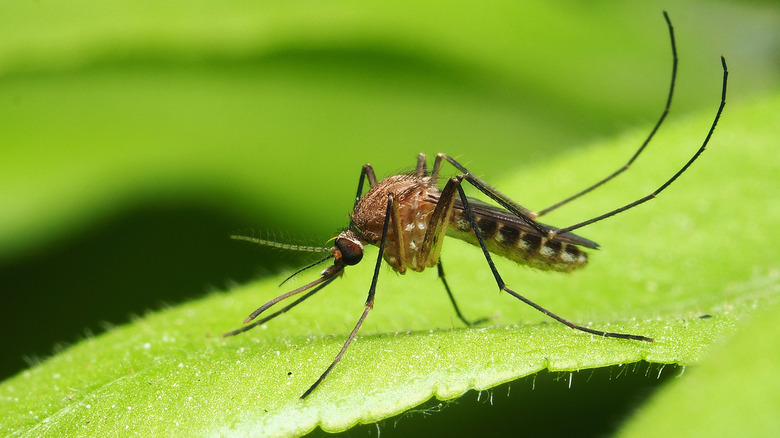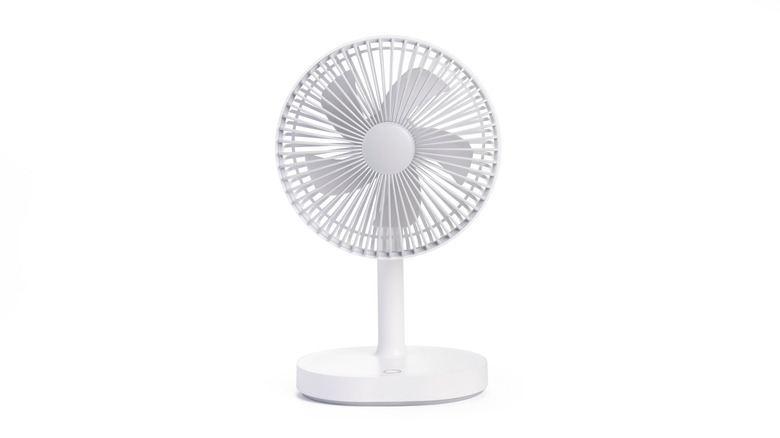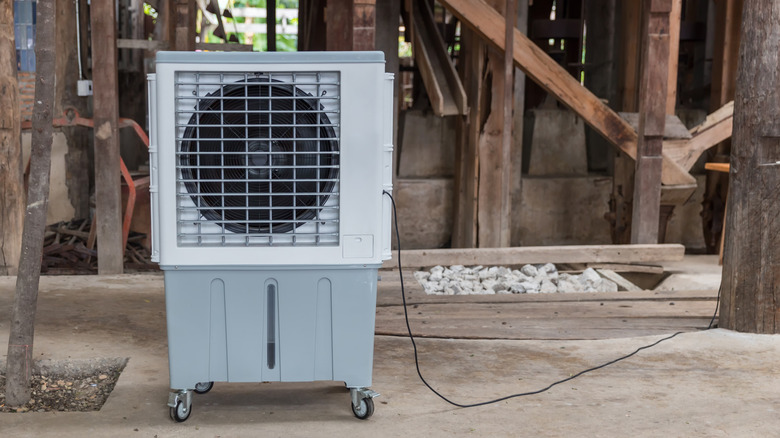Is This Common Household Item A Good Mosquito Deterrent?
Dalai Lama famously said, "If you think you are too small to make a difference, try sleeping with a mosquito." Bombs, sprays, swatters, and various repellents are the first line of defense against the mosquito, the whining uber pest that is the bane of everyone's summer. In addition to these typical weapons, there is a common household item that is also an effective deterrent — a fan. Whether ceiling, standing, hand-held, or clip-on, fans are useful mosquito fighters, both indoors and out.
Mosquitoes (Iberian for little fly) are at least 400 million years old, and today there are an estimated 2,500 species worldwide. They are a food source for songbirds, bats, fish, frogs, and spiders, among others. However, they are also responsible for spreading the Zika and West Nile viruses, malaria, yellow fever, and dengue fever. Mosquito-borne illnesses kill 1 million annually, making the creature the world's deadliest, according to Eartheasy. Some might also say, the most annoying.
Mosquitoes are feeble fliers who steer clear of winds, according to the University of Washington. They are attracted to the carbon dioxide and lactic acid emitted by humans (and their pets). The insects also favor high humidity and air that is still and heavy, explains Mosquito Magnet. Therefore, it stands to reason that a fan would be an effective anti-mosquito weapon by counteracting what they like.
Fans vs. mosquitoes
A mosquito follows a carbon dioxide trail to locate and zero in on its victim. It identifies the presence of the gas in the air using a specialized organ. Using a rotating fan — or better yet, multiple ones — will confound the insect by dispersing and weakening the carbon dioxide scent it is drawn to. A mosquito is capable of flying at approximately one mile an hour, per Bustle, and the air moved by a fan operates at least five times that rate. A speedier airflow will keep mosquitos away more effectively.
According to the Benton County Mosquito Control District, some of the tiny insects weigh only 2.5 milligrams. A strategically placed fan will keep them off you or your barbecued food with ease. MedicineNet reports that a whirring fan can eliminate insect landings by almost as much as two-thirds. Moreover, fans will make the surrounding air dryer, deterring the humidity-loving mosquito. Since fans also cool the user, they reduce the quantity of sweat produced and thereby lessen the amount of lactic acid produced. There are a variety of fans to choose from, and overhead ones, standing fans, and personal clip-on ones all help to keep mosquitoes at bay.
Complementary deterrents
Instructables recommend using a box fan as a mosquito trap. To operate, attach a piece of window screen to the fan's rear grate. Mosquitoes will be sucked onto the screen, where they can be eliminated. Alternatively, an electric, fan-equipped mosquito trap uses CO2 as a lure and sucks the bugs into a receptacle.
Orkin points out that while fans effectively deter mosquitoes, further measures are needed for more complete protection. Screens and netting are obvious tools. Dark colors attract pests and also trap carbon dioxide, according to Mosquito Nix, so light clothing is better. Citronella candles are a time-worn remedy and citronella plant varieties will also help keep mosquitoes away. Lavender, basil, and mint will also discourage them. Cedar mulch is a good option too. Installing a birdhouse will draw birds to your property, some of which will devour mosquitoes. Of course, mosquito repellents, both chemical and natural, will enhance a fan's ability to deter the little dive bombers.


